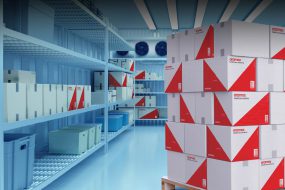

Cold chain logistics is essential for maintaining products at optimal temperatures during storage and transportation. In healthcare, however, its role is even more critical. It involves precisely handling, storing, and transporting temperature-sensitive items such as vaccines, medicines, and biologics. Maintaining strict temperature control is vital to preserving the efficacy and safety of these products, making cold chain logistics the cornerstone of global healthcare supply chains. This ensures that life-saving treatments reach patients without compromise, regardless of distance or climate conditions.
Cold chain logistics: why it matters
Have you ever wondered how medicines and vaccines are delivered to hospitals and pharmacies without losing their effectiveness? The answer lies in cold chain logistics. This specialised logistics system is crucial in maintaining the safety and potency of vaccines and other sensitive medications. Public health and significant financial investments would be at risk without precise temperature control and management.
As the demand for reliable drug transportation continues to grow, the healthcare cold chain logistics market is expanding rapidly. Experts project it will reach $1,307.88 billion by 2030, driven by consistent growth in the coming years.
Key things to consider
When healthcare providers or logistics companies set up a cold chain, they must consider various factors. Keeping items in strict temperature ranges is just the start. Monitoring transport times, following regulations closely, and having strong risk management strategies are vital. Getting these factors right ensures the safe journey of temperature-sensitive healthcare products from storage to delivery.
Related article: How Healthcare Logistics is Transforming in the Middle East
Components of cold chain logistics
For cold chain logistics to succeed in healthcare, several pieces need to fit together:
Temperature monitoring and control
Monitoring temperature is crucial. Tools like IoT sensors and real-time trackers allow for close monitoring of shipments and intervention if something goes wrong. These tools help products stay within the necessary temperature limits, ensuring everything arrives safely.
Packaging and storage
Packaging isn’t just about wrapping things up—it’s about creating the right environment for the product. Insulated containers and phase change materials (PCMs) help keep things cool. Without these, drugs might not reach patients in good condition. As eco-friendly packaging becomes more popular, the industry is finding new ways to balance environmental responsibility with maintaining safe temperatures.
Transportation and handling
Transporting healthcare products requires maintaining stable temperatures throughout the journey. Specialised trucks and containers are utilised to prevent significant temperature fluctuations. Third-party logistics (3PL) companies play a role in ensuring compliance and stability during transport. Proper handling during loading and unloading is also crucial to minimise exposure to harmful temperatures.
Related article: How Cold Chains Work to Protect Your Products
Best practices for maintaining cold chain integrity
Ensuring the integrity of cold chain logistics for healthcare products is essential. The following practices can help maintain operational efficiency:
Follow regulations and standards
Healthcare cold chain logistics is heavily regulated. For example, the World Health Organisation (WHO) sets strict temperature guidelines for moving medicines. These rules apply across various forms of transport, including air freight and shipping services. Maintaining these standards prevents products from spoiling and ensures patients receive medications that are safe to use.
Use the right equipment and technology
Sensors, specialised containers, and automated refrigeration systems are critical for cold chain logistics. These tools are essential in air freight, where flight temperatures fluctuate. Reliable equipment protects products and can help lower freight and other operational costs by reducing the need for replacements.
Staff training and knowledge
Training is essential for all personnel involved in cold chain logistics. Staff should be knowledgeable about equipment usage, product handling, and emergency response procedures. Continuous training programs are necessary to ensure readiness to maintain the integrity of the cold chain.
Examples of cold chain in action
Cold chain logistics was spotlighted during the COVID-19 pandemic, showing how critical it can be.
COVID-19 vaccine distribution
During the pandemic, vaccines required safe transportation to millions of people globally. A significant contributor to this effort was UNICEF, which delivered ultra-cold chain freezers to countries needing storage aid. Innovative packaging and monitoring technologies were employed to minimise vaccine spoilage.
Future of cold chain in healthcare
As cold chain logistics keeps evolving, innovations are making the process faster, safer, and more efficient.
Emerging technologies
Blockchain is helping to create a transparent and secure way of tracking shipments. It allows healthcare providers and shipping services to monitor products at every stage. AI is also contributing to changing dynamics in logistics. Predictive analytics helps anticipate disruptions, saving shipments from possible adverse incidents. Autonomous vehicles and drones are also used to deliver healthcare goods, especially in remote areas.
Related: Exploring the Future of Supply Chain Transparency with Blockchain Technology
Better packaging and tracking technology
Packaging continues to advance, with innovative options like RFID tracking that alert handlers if temperatures drop. Real-time monitoring tools powered by the Internet of Things (IoT) provide live data to improve air freight and shipping services.
Cold chain-as-a-service (CCaaS)
Outsourcing cold chain operations can be a smart move for some healthcare providers. The CCaaS model lets them scale operations without needing massive investments in equipment or technology, saving both time and money.
Sustainable practices
As environmental concerns grow, so does the demand for greener practices. Recyclable materials and energy-efficient refrigeration can help cold chain logistics become more sustainable. The challenge lies in balancing these efforts with maintaining the right conditions for sensitive products.
Final Thoughts
In healthcare, cold chain logistics involves more than just transporting products; it’s about protecting lives. Companies like Aramex are demonstrating that investing in innovative technology, packaging, and training can establish a secure system for temperature-sensitive products. Advancements in real-time monitoring, blockchain technology, and artificial intelligence will further enhance logistics, reduce freight costs, and ensure product safety. Keeping pace with these developments is vital for healthcare providers who wish to remain competitive while safeguarding their most critical cargo.
Unlock seamless healthcare logistics. Discover our comprehensive solutions!




